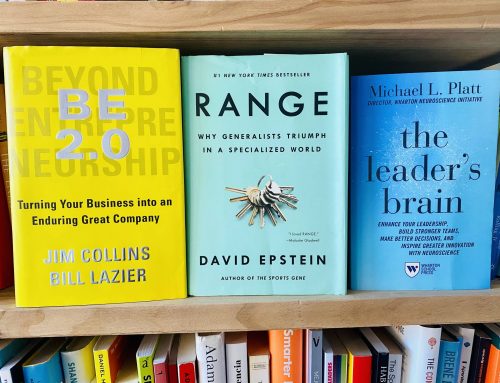Every time that people list their fears, there is one that appears even before death: public speaking. Actor and comedian Jerry Seinfeld used to say that “if you have to go to a funeral, you’re better off in the casket than doing the eulogy.”
In this post we are going to explore the toxic side of fear and how to face it when speaking in public. If we want someone to experience fear, there is nothing better than putting them on a stage in front of a few hundred people.
How can we then manage fear and suffer as little as possible in these often-uncomfortable situations?
1) Change the label. Let’s call things by their name:
In a study run at Harvard Business School, professor Alison Wood Brooks told her students that in two minutes they will have to go on stage and deliver a persuasive speech that would be evaluated. Just before getting on stage, Brooks asked them to speak three words out load. She randomly assigned them to say either “I am calm” or “I am excited.”
The Word calm vs excited was enough to change the quality of their speeches. Those who said “excited” were rated as 17% more persuasive and 15% more confident than those who said the word “calm”. Besides, those who said “excited” enjoyed more on stage and spent an average of 37 seconds more on stage.
Why does getting excited work better than trying to calm ourselves down?
If you are about to speak in front of fifty people, or to take an important exam, or to approach a person you feel something for, trying to relax is like wanting to stop a truck that is driving 60 miles per hour, it takes time because the vehicle has momentum. As psychologist Adam Grant says, “fear is an intensive emotion and, therefore, instead of suppress it, it is easier to convert it into another emotion, equally intense, but that propels us to step on the gas.”
It is then paradoxical that the best thing to relax is precisely to get excited, to tell our inner self that, if we are nervous and afraid, it is because it matters to us and we can focus on the reasons what drive us to go forward (ie: the excitement of sharing our work/passion/art, the possibility to deliver something useful for other people, something that will make us grow professionally, etc.)
2) Build upon success. To do so, you’ll need to force yourself to present any time you get a chance. Practice and systematic training will help us feel support and comfort in those positive experiences and gain confidence as a consequence. And yes, it will not be comfortable. But remember, if it is feeling comfortable, it means that you are not learning.
3) Trust your truth. If you have worked the number one step to manage fear (knowledge), odds are you’ll be the person in the room that knows more about the topic you’ll be speaking about. If you believe your truth, if you trust in what you transmit, you’ll be halfway there before you even notice.
To conclude, here is a video that summarizes these two sides of public speaking fear: the initial paralysis and the enormous satisfaction of overcoming our own fears. The documentary is called “Ten Meter Tower” and in it, a group of people faces the decision of jumping or not from a ten meter springboard. You will see their fears, reactions…and, just for the record, I guarantee you that those who jumped went home much happier than they arrived there ;).
Should we jump?
Pedro Díaz-Ridao







Very Helpful Tip. Thanks Pedro!
Thank you Paddy!
Got to agree on how the fear has to be controlled and redirected into a more productive emotion; if we would get that weird sensation, that’s when we have to get worried, it means our body no longer react to the environment, an inhibition of the soul.
And i think once you start, you gotta keep on it, talking, finding how people react, what tools they like and how to control an audience.
It’s not easy for some people, i wouldn’t say it is easy for me neither, but i know my strength and weakness and at least i know how to pull the strings out of each side.
I completely agree, it all depends on what works for you, and, as I say, we have to listen to our body. And as every mastery, all it takes is time, practice and the willingness to get better. Have a great week and thanks for your comment.